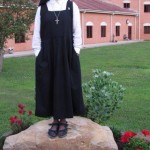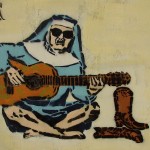“Was not Nagasaki the chosen victim, the lamb without blemish, slain as a whole burnt offering on an altar of sacrifice, atoning for the sins of all nations during World War II?” – Dr. Takashi Nagai 1908-1951, on Martyrdom, from All Saints by Robert Ellsberg
It is the rarest of days when I disagree with my favorite blogfather Ed Morrissey, but after mulling over this post of his as well as others, and after thinking quite a lot about the forced conversion of Fox News’ Steve Centanni and Olaf Wiig while under the guns and knives of their Islamofascist captors, I find that I do disagree with him.
Ed wrote:
I, for one, am happy that Centanni and Wiig had the wits and the luck to get out of Gaza alive. That to me is a victory.
He is not alone in thinking this way. Indeed, I would bet he is among a fair majority (including an engineer friend) who are perhaps overthinking the thing.
Faith and Reason share a kinship, and within that kinship the natural and supernatural wave back and forth, like wind-stirred wheat in a field, but only to an point. The gift of faith is itself supernatural, but let’s call it a small-s-supernatural, one in which reason may be easily ascertained. I think once circumstances have led one – willingly or unwillingly – to confront capital-S-Supernatural, the waters become very deep, and reason must necessarily hang back near the shore.
The demand to “convert or die” is not a thinking demand, it is not born of reason. It is culled forth from a dark heart given over to something larger than a human sense or sensibility. It is an unnatural requirement; it is Supernatural. As such, it can only be properly answered through Supernatural means, through a heart that is not dark but which is equally given over to something larger than our rational and reductive imaginings. Can you reduce the response to a forced conversion into whether one “meant it” or not? Yes, you can, but in doing so you have taken your eyes off of something hugely in play but easy to miss – that the greatest feats of heroism written in the annals of human history have come about through a combination of faith and reason, but with reason bringing up the rear.
Firefighters on 9/11 asked a blessing from Fr. Mychal Judge before they headed into the burning towers of the World Trade Center. Reason cautioned that running into such a hellish conflagration was foolhardy – faith whispered something else, and it won.
Reason told Casper ten Boom and his spinster daughters Corrie and Betsy that it was risky-unto-madness to try to hide Jews in a bedroom wall while Nazis occupied their village – faith shrugged, “how can you not take the risk?”
Reason told the 16 Carmelites of Compiegne that renunciation would save their lives; after all, anyone would know they didn’t really mean it. Faith said, “trust in the Lord at all times,” and they went to the guillotine singing psalms and offering their necks for the defeat of “The Terror,” which, it must be said, came to an end some ten days later.
It has been mentioned that we are battling an enemy that “loves death more than life.” Certainly we have seen that they are willing to die for their beliefs. An enemy who does not care if he dies as long as he can kill you, too, is an enemy who cannot be reasoned with. This is an enemy thoroughly appreciative of the power of martyrdom, its ability to inspire, to convince and even to claim victory. We seem to have forgotten that martyrdom – a foolish waste, to Reason’s sensibility – is often the key componant toward changing social perceptions and even morals. The virgin martyrs, much derided in our “enlightened” era, were the first women to declare themselves set apart, meant to be more than chattel, able to declare themselves as belonging to no man or house, to “no one but Christ.” An unheard of concept!
To my knowledge, the pre-kidnapping religious beliefs of Centanni and Wiig are unknown. Some say that if the men had no particular faith to start with, their going along with a forced conversion was a reasonable tactic, and perhaps it was. If faith is meaningless to you, then a forced conversion will be too. Frankly, if you held me at gunpoint and told me to confess myself a Democrat, or even a Boston Red Sox fan, I’d do it in a heartbeat. Hollywood aside, political parties and baseball teams, with very few exceptions, are not the concerns of angels, who fight more pressing battles.
But whether Centanni and Wiig were men of faith, or not, their “conversions” were a sort of victory for our enemies. They displayed to the world what the West “holds dear.” I am not saying the newsmen were cowards, not at all. I’m only saying that in a clash of civilizations, their pronouncements about Allah and Mohammed, and their confession of new, Islamic names, was a real-time demonstration to the Islamofascists in our midst that “staying alive,” means the world to us. It can be translated as “look at these callow Western dogs, so in love with life, so beholden to nothing that they will say anything, do anything, even allow us to rename them, to cling to life…while we will give up everything…”
The re-naming of these two Western men is particularly telling. While it may mean nothing at all to a secularist, it means quite a lot to the Islamists watching the world over, and to the Christians and the Jews, as well, because they too understand it. Abraham, Noah, Jacob, Sarah, even Peter and Paul were all given new names by God, the new names had to do with relationship and covenant. “I shall give you a new name,” is one of God’s promises. To give up one’s name is to give up one’s self. To allow someone else to name you is to count yourself the lesser. It might all seem pretty innocuous to Reason. To Faith, however, this is fraught with meaning – this is all about surrender and the handing over of power. By proclaiming their new Islamic names Centanni and Wiig – probably quite unwittingly – were declaring themselves new men in Allah. They were also living metaphors for the surrender of “the lesser” West.
I wonder, in war, can any innocent captive live or die only to themselves? I don’t think so, not when our enemy is so fluent in the language of symbolism and imagery.
Martyrdom is not about justice – it is not about reasonable death. It is about exactly the opposite, it is about facing down what is completely unreasonable and unjust and offering oneself to the cause of what is just – is reasonable. And yes, there is victory in it. But belonging, as it does, to the realm of the Supernatural, that victory is not always obvious and clear. Still, we all know that simply because a thing is not obvious does not mean it is untrue. The Carmelites of Compiegne and Takashi Nagai knew that.
Am I urging the West toward martyrdom, here? No, I am not urging it. But I am suggesting throughout history, martyrs have spilled blood and it has made a difference. I am suggesting that down the line some may well be called to martyrdom, and we might be wise to anticipate it and understand its use. I am suggesting that when one is caught in a fight between darkness and light – a fight that is more super than natural – such blood might well be required. It always has been, before.
Please check out the links below, bloggers and op-eds on the topic, some agreeing, some disagreeing. Kobayashi Maru’s post is particularly thoughtful, and there is much to think about, here. Also, I’ll be including those books referenced here, The Hiding Place and To Quell the Terror: The Mystery of the Vocation of the Sixteen Carmelites of Compiegne Guillotined and All Saints in The Bookshelf, as they are all great reads.
Check out The Sanity Squad’s Podcast for last week, which discusses this topic from the perspective of mental health professionals – very interesting, indeed, particularly Shrinkwrapped’s remarks.
Related: Sr. Leonella’s Victory
Related:
Kobayashi Maru; The Saints Are Watching: Fear and Faith on the Nightly News
neo-neocon; Conversations on Conversion
All Things Beautiful;Welcome to Saudi America
Buster on The Gift Freely Given
Ed Morrissey; On the Decision for Martyrdom
Maternal Optimist; Spiritual Rape
Mark Steyn: We Cede Our Values for Free
Pastorius; How can we look upon you in your shame?
Kathleen Parker; The Religion of Peace at Gunpoint
David Warren; Doing the Enemy’s Work
Jules Crittendon; Martyrs Wanted











